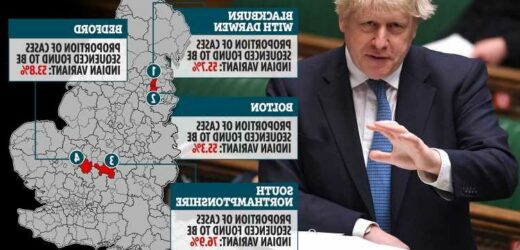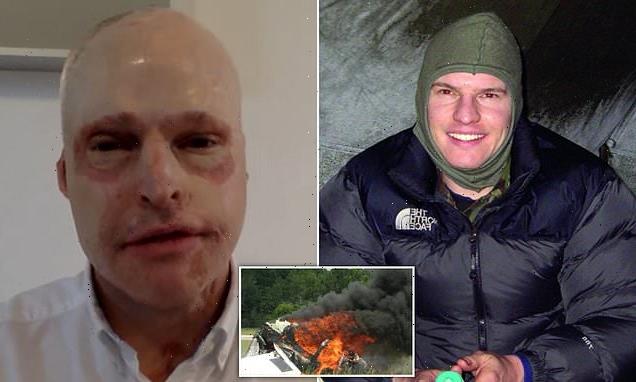BORIS Johnson could be forced to delay the total lifting of lockdown on June 21 if cases of the Indian Covid variant continue to spiral.
Foreign office minister James Cleverly said the PM is prepared to alter his roadmap to freedom if scientists advise him it's necessary to do so.
🔵 Read our coronavirus live blog for the latest updates
Asked if the final stage of the reopening could be put back, he replied: "The scientists on Sage will make their assessments.
"They will report that to Government and we will make the decisions based on the data and the evidence they provide.
"The PM and the health secretary have always been clear the easing of restrictions, which will allow us to get back to normality, will be done at a pace and in a way which is safe and we will always be driven by the data."
Mr Cleverly said the UK is well placed to deal with new variants because of our "world class genomic sequencing capability, huge number of tests, and incredibly effective vaccination programme".
He added: "We want to make sure we’re always basing our decisions on the most up to date scientific data.
“But we have seen incredibly positive numbers because of our vaccine programme.
"We’ll be keeping a close eye on all variants to make sure we move forward appropriately and safely."
It comes as:
- Experts warned that the Indian variant could be up to 60 per cent more transmissible than the Kent strain
- The work-from-home order should END next month when lockdown is over, the PM said today
- New variants pose a 'lethal danger' and could spark the worst Covid wave yet, Boris Johnson warned
- The government announced a full public inquiry into coronavirus, beginning in Spring 2022
- A senior minister refused to rule out local lockdowns to crack down on Covid hotspots
The threat of new variants is one of the four tests the PM has laid out for proceeding with each step of his lockdown roadmap.
Scientists are confident any third wave, if it materialises at all, will be much smaller thanks to the effectiveness of the vaccines.
Professor Adam Kucharski, who works on modelling provided to ministers, said real world data has landed at the "optimistic end of the scale".
He added: "We could still see some increase in transmission as things reopen.
"But the resulting impact could be relatively low if the vaccine programme stays on track and we don't end up with variants that can partially evade immunity."
Steven Riley, a professor Infectious Disease Dynamics at Imperial College London, says ministers will "have to keep a really close eye" on the Indian variant.
But he told Times Radio: "Even if infections start to go up, we then need to assess whether that's bringing a lot of new cases into hospitals and there's certainly no sign of that at the moment."
And boffins are so confident in the impact of the jabs rollout they're preparing to give the green light for masks and social distancing to be scrapped this summer.
Plans being drawn up by the National Economy Recovery Taskforce would see face coverings axed almost everywhere except on public transport.
Government scientific advisers are set to hold an emergency meeting today to discuss the rise of Indian variant Covid cases.
The Scientific Advisory Group for Emergencies (Sage) fear the jump in infections may hit the June 21 date to ease restrictions further.
Cases of the Indian variant are said to have more than tripled in a week, with the Prime Minister admitting the surge is "of increasing concern".
A member of Sage told the i newspaper "a delay is possible" to next month's final step out of lockdown.
When asked about local lockdowns being brought in to tackle any rise oin cases, George Eustice, the Environment Secretary, admiitted that the Government “can’t rule anything out”.
But Downing Street is confident Britain's vaccine rollout will combat any new wave of infections.
More than 36million people in the UK have had at least one dose of a vaccine, with 18.4m receiving both jabs,
The Sun revealed today that masks in shops and offices, as well as social distancing, are heading for the chop on June 21.
Sage had previously estimated that a third wave could kill 100,000 Brits.
But in estimates released this week it revised the number down to 9,000 deaths "in the worst case scenario" by June 2022.
Pfizer believes its vaccine will work against the Indian variant, withthe European Medicines Agency (EMA) saying there is “promising evidence” the jabs will counter the strain.
There is also evidence the AstraZeneca vaccine will offer protection from death or serious injury from the virus variant.
The B.1.617.2 variant is believed to make up half of all Covid infections in London, Bedford and South Northamptonshire and be spreading 60 per faster than other strains of the virus.
Bolton has seen the highest rise in Indian variant cases, as overall infectionsleapt by 93 per cent in a week.
Public Health England has launched surge testing in Bolton to tackle the spread.
Erewash in Derbyshire, Blackburn, Bedford, South Northamptonshire and Sefton and London have also seen increases.
There are three Indian variants in the UK, named B.1.617, B.1.617.2 and B.1.617.3.
Research by The Telegraph found that the main Indian variant of concern – B.1.617.2 – has spread three times as fast as other Covid variants.
Yesterday, case numbers in the UK rose by 2,284, up by seven per cent on last Tuesday's figure.
Mr Johnson stressed the need for caution and vigilance as lockdown is eased, with the next step on May 17.
He said "the end of the lockdown is not the end of the pandemic".
"The World Health Organisation has said that the pandemic has now reached its global peak and will last throughout this year," Mr Johnson told the Commons today.
On Tuesday, Professor Paul Hunter, from the Norwich School of Medicine at the University of East Anglia, said: “Fortunately as yet there is no sign that hospitalisations have started to increase in the UK.
“There has been a lot of debate about when and if a further wave of infection will happen in the UK. The reports of today suggest that this wave may have already begun.
“That hospitalisations have yet to increase would be consistent with the view that vaccine is still effective at reducing the risk of severe disease and gives hope that this new wave, if it indeed continues, will be less damaging to the NHS.”
Source: Read Full Article








